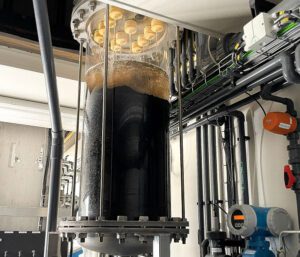As the Environmental Protection Agency prepares to release its drinking water regulations on per- and polyfluoroalkyl substances (PFAS), also known as “Forever Chemicals,” the Tampa Water Department is exploring a pioneering approach that will put it well ahead of the curve.
Suspended Ion Exchange, or “SIX,” will help address Tampa’s water quality needs as well as position the Water Department to meet the EPA’s future drinking water regulations. The Tampa Water Department is working to adopt this state-of-the-art technology at the David L. Tippin Water Treatment Facility. Once complete, this will become the first SIX facility in America and the largest in the world.
 PFAS are man-made chemicals that are widely used and break down slowly over time. Researchers are trying to determine the impact of long-term PFAS exposure; however, scientific studies show that PFAS may be linked to negative health effects in humans. The EPA is expected to release its finalized regulations on six PFAS chemicals by the start of 2024. The proposed limits, which have yet to become official, are 4 parts per trillion. To put that into perspective, one part per trillion is equivalent to a drop of water in 20 Olympic-sized swimming pools.
PFAS are man-made chemicals that are widely used and break down slowly over time. Researchers are trying to determine the impact of long-term PFAS exposure; however, scientific studies show that PFAS may be linked to negative health effects in humans. The EPA is expected to release its finalized regulations on six PFAS chemicals by the start of 2024. The proposed limits, which have yet to become official, are 4 parts per trillion. To put that into perspective, one part per trillion is equivalent to a drop of water in 20 Olympic-sized swimming pools.
The David L. Tippin Water Treatment Facility monitors PFAS levels in its finished water as part of the EPA’s Unregulated Contaminant Monitoring Rule requirements. Testing completed over the last year showed some PFAS variants were detected in the samples, with the levels of two PFAS chemicals, PFOA and PFOS, detected slightly above the proposed limits in some samples. Currently more than 33% of Florida’s water treatment facilities exceed the proposed limits.
There are a limited number of technologies capable of minimizing PFAS levels in drinking water. While many utilities are still trying to determine how they might address the upcoming regulations, the Tampa Water Department already has a framework in development, and SIX is an essential piece of that solution.
“The City of Tampa and the Tampa Water Department are committed to providing our residents with clean, safe drinking water,” said Tampa Mayor Jane Castor. “There are a limited number of technologies capable of minimizing PFAS levels in drinking water, making this technology a critical investment to improve the quality of our water for generations to come.”
The Tampa Water Department initially piloted this technology in 2020. The Central Florida pilot program showed that SIX will provide additional benefits, including:
- Reducing the amount of chemicals needed to treat local drinking water, saving the department approximately $1.4 million each year.
- Improving the quality of local drinking water.
- Increasing operational safety at the David L. Tippin Water Treatment Plant.
The results of the pilot were so promising that the SIX pilot is now being tested at the Howard F. Curren Advanced Wastewater Treatment Plant. The technology is of interest to many other utilities in Florida and beyond, with utility tours scheduled.


